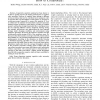Free Online Productivity Tools
i2Speak
i2Symbol
i2OCR
iTex2Img
iWeb2Print
iWeb2Shot
i2Type
iPdf2Split
iPdf2Merge
i2Bopomofo
i2Arabic
i2Style
i2Image
i2PDF
iLatex2Rtf
Sci2ools
109
Voted
TCOM
2010
2010
Evolutionary cooperative spectrum sensing game: how to collaborate?
—Cooperative spectrum sensing has been shown to be able to greatly improve the sensing performance in cognitive radio networks. However, if cognitive users belong to different service providers, they tend to contribute less in sensing in order to increase their own throughput. In this paper, we propose an evolutionary game framework to answer the question of “how to collaborate” in multiuser de-centralized cooperative spectrum sensing, because evolutionary game theory provides an excellent means to address the strategic uncertainty that a user/player may face by exploring different actions, adaptively learning during the strategic interactions, and approaching the best response strategy under changing conditions and environments using replicator dynamics. We derive the behavior dynamics and the evolutionarily stable strategy (ESS) of the secondary users. We then prove that the dynamics converge to the ESS, which renders the possibility of a de-centralized implementation of the pr...
Secondary Users | Sensing | Sensing Game | TCOM 2010 |
Related Content
| Added | 30 Jan 2011 |
| Updated | 30 Jan 2011 |
| Type | Journal |
| Year | 2010 |
| Where | TCOM |
| Authors | Beibei Wang, K. J. Ray Liu, T. Charles Clancy |
Comments (0)

